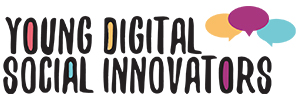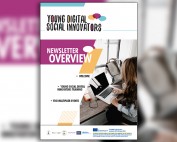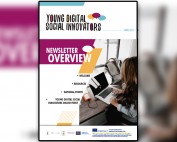More about YSDI
 Against a backdrop of rising inequality, cutbacks in public services, and marginalisation (and/or radicalization) of disadvantaged young people, the project will make a significant contribution to the EU’s Youth Agenda of active, engaged, connected and empowered young people. Social innovation empowers young people to shape the world around them. Young social innovators develop key competences such as creativity, problem solving, empathy and communication which they apply in ways that develops their active citizenship and connection to their local community.
Against a backdrop of rising inequality, cutbacks in public services, and marginalisation (and/or radicalization) of disadvantaged young people, the project will make a significant contribution to the EU’s Youth Agenda of active, engaged, connected and empowered young people. Social innovation empowers young people to shape the world around them. Young social innovators develop key competences such as creativity, problem solving, empathy and communication which they apply in ways that develops their active citizenship and connection to their local community.
Digital technology can take social innovation to the next level: “Digital technologies pervade every part of our lives. We need to understand how they work in order to make the world work better. But we risk another generation growing up as passive digital consumers rather than confident digital makers.” (Young Digital Makers, 2015, NESTA) However, currently our youth organizations are poorly equipped to engage young people in digital social innovation.
 Finnish authorities have also identified this issue as highly pertinent to youth work: “the process of technologisation has irreversibly changed the civic skills that are required of young people in the future. What follows is that the digitalisation of youth work is an absolute requirement to keep up with the times.” (Verke, Finnish Centre of Expertise for Digital Youth, 2017).
Finnish authorities have also identified this issue as highly pertinent to youth work: “the process of technologisation has irreversibly changed the civic skills that are required of young people in the future. What follows is that the digitalisation of youth work is an absolute requirement to keep up with the times.” (Verke, Finnish Centre of Expertise for Digital Youth, 2017).
In response, Young Digital Social Innovators aims to empower young people to become confident social innovators making the most of digital technology available to them. To do so, we will modernise youth work curricula and practice so that digital social innovation (DSI) can be taught to a high standard across a wide range of youth-serving organisations. Hence our project involves the following stages and outputs:
 IO1: “All you need to know” Guide to Digital Social Innovation for Young People. A comprehensive and user-friendly digital publication which makes a clear case for the relevance of DSI, how it relates to key competences, and how it can be taught effectively in non-formal education.
IO1: “All you need to know” Guide to Digital Social Innovation for Young People. A comprehensive and user-friendly digital publication which makes a clear case for the relevance of DSI, how it relates to key competences, and how it can be taught effectively in non-formal education.
IO2: Young Digital Social Innovators’ Toolkit. An interactive, digital resource to guide youth educators through 10 free tools/apps useful for social innovation, highlighting their specific strengths and appropriate pedagogic strategies.
IO3: Curriculum & OERs. Including a curriculum, learning objectives, lesson plans, assessment guides, and access to a variety of original teaching content in digital format these free resources provide educators with a complete toolkit for introducing DSI activities, especially for at risk young people.
IO4: Young Social Digital Innovators’ Online Course & Knowledge Exchange Platform. Based on the OERs, a free, open online learning resource that develops young people’s digital social innovation skills in a multilingual, user-friendly format.
The project will impact local communities by improving the quality and accessibility of social innovation education for young people from the most disadvantaged backgrounds, communities will experience an increase in social and knowledge capital, with young people feeling more part of their communities and more empowered as leaders of projects which contribute to a more inclusive and just society.
On a European level the project will impact positively on the ongoing work of EU bodies to develop robust yet practical frameworks for competence development and importantly, to see these being used transversely across all types of education, not just in VET or schools.






